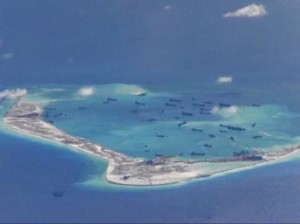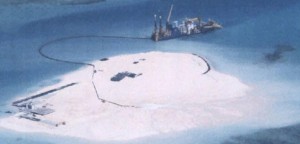South China Sea: freedom of navigation vs territorial sovereignty

Chinese dredging vessels are purportedly seen in the waters around Mischief Reef in the disputed Spratly Islands in this still image from video taken by a P-8A Poseidon surveillance aircraft provided by the United States Navy May 21, 2015. United States Navy
By RFI
China summoned the US Ambassador in Beijing on Tuesday over what it called an attempt by Washington to militarise the South China Sea, after a US destroyer sailed within twelve nautical miles of artificial islands China is building in contested waters.
The USS Lassen, a guided missile destroyer, passed within the normal limit of a formation claimed by China, which said its own warships monitored, shadowed and warned the vessel over the exercise.
China says the patrol was an “extremely irresponsible” infringement on its sovereignty, while the US says it was operation freely under international law.
“The US is telling China that according to international laws, seen from the US point of view, there is freedom of navigation in the South China Sea, and that building artificial islands does not equal sovereignty,” says Jean-Vincent Brisset, Senior Fellow at the Institute of International and Strategic Relations in Paris.
While Beijing claimed the exercise was illegal and done without permission of the government, the US has been warning such an exercise was on its way.
China has been transforming reefs and outcrops in the Sea into artificial islands with potential military use, but its claim to the area is not recognised by its neighbours or under international law.
“The Chinese are certainly not going to back down over the structures they have erected, and they well upgrade what they’ve done so as to develop capability for landing aircraft or better harbours with ships,” says Rod Wye, associate fellow with the Asia program at Chatham House in London.
“This course brings them into conflict not simply with the United States over freedom of navigation issues, but with other countries in the region that also have claims to some of the islands.”
Several countries in the region, including US allies, have claims of their own, raising raised fears of open conflict.
“US allies in the region, such as Japan, South Korea and Indonesia, would like the US to play more of a role in the region through these freedom of navigation operations,” says Theresa Fallon, senior associate at the European Institute for Asian Studies in Brussels.
US defence authorities said such freedom of navigation exercises will likely become regular operations in the future.
China, meanwhile, has been expanding the reach of its navy and replied that it was prepared to respond to any country’s provocations.
The two developments have raised fears of a potentially explosive situation.
“Something very simple like an exercise could have unintended consequences, but nevertheless, doing nothing also has risk,” Fallon says.
“The question is: will these freedom of navigation operations change China’s behaviour? Or will China use it as a way to build up their islands more rapidly?”
In: rfi

